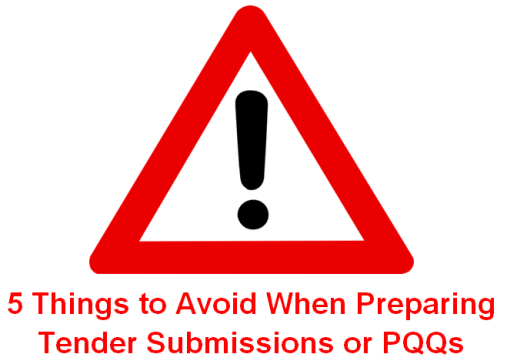
One of the very first posts that I wrote was on the 10 most common tendering mistakes. It shows the main errors made when preparing tender submissions or PQQs. Many of these are pretty fundamental mistakes such as missing information, which will quickly lose you marks.In this post I want to explore some more potential tendering pitfalls. These are less about omissions but more about mindsets or your approach. Make sure that you avoid them when next preparing tender submissions or PQQs.
When Preparing Tender Submissions or PQQs Don’t Make These Mistakes
1. Get ‘Tender Rage’
This usually applies to people who are new to tendering. They feel annoyed by having to tender for a contract in such a complicated manner. But most of us have got angry about the whole tendering process. I call this ‘Tender Rage’. Or ‘Getting the Grey Mist’ (there’s too much paperwork involved to get the full Red Mist!).
I can completely understand why people get it. Tenders involve a lot of effort. You have to deal with numerous complex questions and pricing schedules as well as long contracts and specifications. And let’s face it, some tenders are really badly written.
I’ve seen people compile a list of 30+ clarification questions! Not just because there are that many aspects on which they are unclear, but because they want to hit back at the tender panel.
I always try and remain calm and explain to clients why organisations tender. I also explain the tendering process. Then I recommend taking a break and starting afresh the next day. But also to make sure that the tender opportunity is for you (see next point No. 2).
2. Not Qualifying or Being Selective
You want to win a contract and develop your business. You then see a tender opportunity in your general line of work. The normal reaction is to bid for it. But tempting as it might appear, the tender might not be right for you.
One of my strongest pieces of tendering advice is to be be selective and qualify each tender. I hate the thought of working on a tender submission or PQQ that cannot, or is unlikely to, be won. That does give me Tender Rage!
Only bid on good opportunities.
3. Not Planning
When I run tender training courses, one of the things that people notice is how long the section on tender planning is. It isn’t because I’m obsessive on detail but planning pays off.
High-value tenders tend to be multi-faceted and complex. They are resource and time heavy. As such they are expensive. But the payback is a great big contract that could have a big impact on your business for many years. Proper project planning helps ensure that everything is covered – and correctly.
4. Not Showing a Professional Image
In the most common tendering mistakes you see that many are caused by lack of attention to detail or carelessness. The end result gives an unprofessional impression of your company. If you cannot get it right when tendering, how on earth will you perform undertaking a contract?
Of course you may be the consummate professional in your industry but feel totally out of your depth when tendering. First impressions do count. So do everything you can to make certain that your bid looks good.
Whilst it should not directly win you extra marks, it cannot fail to help ‘win over’ the tender panel marking your submission.
5. Writing Generic Tender Responses
Every public sector opportunity shows how the tender will be marked. Most corporate tenders do too. They will inevitably show that top marks are given for responses that exceed their needs, show extra benefits and demonstrate proven experience.
This means that generic or ‘one-size-fits-all’ answers will never get top marks. So avoid using them ‘as is’! They make a great basis for writing a customised tender response. This post explains all about answering tender questions. Use it to get high marks and increase your chances of winning.
If you have any problems with tendering, contact us for an informal chat about help with tenders.
Summary
When you are preparing tender submissions or PQQs, please do try and avoid making these mistakes and you will improve your tender hit rates.
If you have any more top tips on tender planning, please add your comments.


Excellent advice, backed up by experience.
I’ve worked with Tony and can confirm these tips are valid.
He also offers great back up and useful ideas via his website
Many thanks for that Adam – much appreciated!
I had an email from one reader in response to this post. It contained many good tips but one story stood out:
“Encountered chief executives at presentations hogging the limelight. One even made a final throwaway line that incensed the client and lost any chance. Don`t make jokes when presenting needs to be in your mantras.”
I’ve seen similar blunders that have lost the deal.